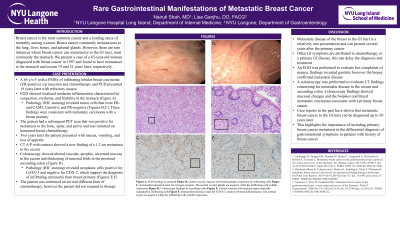Back


Poster Session A - Sunday Afternoon
Category: General Endoscopy
A0276 - Rare Gastrointestinal Manifestations of Metastatic Breast Cancer
Sunday, October 23, 2022
5:00 PM – 7:00 PM ET
Location: Crown Ballroom

Has Audio

Nairuti Shah, MD
NYU Langone Hospital - Long Island
Presenting Author(s)
Nairuti Shah, MD1, Lisa Ganjhu, DO, FACG2
1NYU Langone Hospital - Long Island, Mineola, NY; 2NYU Langone Health, New York, NY
Introduction: Breast cancer is the most common cancer and a leading cause of mortality among women. Breast cancer commonly metastasizes to the lung, liver, bones, and adrenal glands. However, there are rare instances where breast cancer can metastasize to the GI tract, most commonly the stomach. We present a case of a 65-year-old woman diagnosed with breast cancer in 1997 and found to have metastases to the stomach and cecum 19 and 21 years later, respectively.
Case Description/Methods: A 65-year-old female with a past medical history of infiltrating lobular breast carcinoma (ER-positive) status post resection and chemotherapy and PUD presented 19 years later with refractory nausea. EGD showed localized moderate inflammation characterized by congestion, erythema, and friability in the stomach. Pathology (IHC staining) revealed tumor cells that were ER- and CAM5.2-positive and PR-negative. These findings were consistent with metastatic carcinoma with a breast primary. The patient had a subsequent PET scan that was positive for metastasis to the bone, spine, and pelvis and was restarted on hormonal-based chemotherapy. Two years later the patient presented with nausea, vomiting, and loss of appetite. CT of the abdomen with contrast showed a new finding of a 1.2 cm metastasis to the cecum. Colonoscopy showed altered vascular, atrophic, ulcerated mucosa in the cecum and thickening of mucosal folds in the proximal ascending colon. Pathology (IHC staining) revealed neoplastic cells positive for GATA-3 and negative for CDX-2, which support the diagnosis of infiltrating carcinoma from breast primary. The patient was continued on several different lines of chemotherapy.
Discussion: Metastatic disease of the breast to the GI tract is a relatively rare presentation. It can be difficult to detect due to recognition of GI symptoms that are attributed to chemotherapy or a primary GI disease/malignancy. This can lead to delays in diagnosis and treatment. Due to this patient’s initial nausea, an EGD was conducted which revealed gastritis. Biopsies were positive for metastatic carcinoma in the stomach consistent with a primary breast cancer. Subsequent colonoscopy revealed metastatic disease to the cecum and ascending colon. Previously reported cases have shown that metastatic breast cancer to the GI tract can be diagnosed up to 30 years later. This highlights the importance of including primary breast cancer metastasis in the differential of ambiguous gastrointestinal symptoms.
Disclosures:
Nairuti Shah, MD1, Lisa Ganjhu, DO, FACG2. A0276 - Rare Gastrointestinal Manifestations of Metastatic Breast Cancer, ACG 2022 Annual Scientific Meeting Abstracts. Charlotte, NC: American College of Gastroenterology.
1NYU Langone Hospital - Long Island, Mineola, NY; 2NYU Langone Health, New York, NY
Introduction: Breast cancer is the most common cancer and a leading cause of mortality among women. Breast cancer commonly metastasizes to the lung, liver, bones, and adrenal glands. However, there are rare instances where breast cancer can metastasize to the GI tract, most commonly the stomach. We present a case of a 65-year-old woman diagnosed with breast cancer in 1997 and found to have metastases to the stomach and cecum 19 and 21 years later, respectively.
Case Description/Methods: A 65-year-old female with a past medical history of infiltrating lobular breast carcinoma (ER-positive) status post resection and chemotherapy and PUD presented 19 years later with refractory nausea. EGD showed localized moderate inflammation characterized by congestion, erythema, and friability in the stomach. Pathology (IHC staining) revealed tumor cells that were ER- and CAM5.2-positive and PR-negative. These findings were consistent with metastatic carcinoma with a breast primary. The patient had a subsequent PET scan that was positive for metastasis to the bone, spine, and pelvis and was restarted on hormonal-based chemotherapy. Two years later the patient presented with nausea, vomiting, and loss of appetite. CT of the abdomen with contrast showed a new finding of a 1.2 cm metastasis to the cecum. Colonoscopy showed altered vascular, atrophic, ulcerated mucosa in the cecum and thickening of mucosal folds in the proximal ascending colon. Pathology (IHC staining) revealed neoplastic cells positive for GATA-3 and negative for CDX-2, which support the diagnosis of infiltrating carcinoma from breast primary. The patient was continued on several different lines of chemotherapy.
Discussion: Metastatic disease of the breast to the GI tract is a relatively rare presentation. It can be difficult to detect due to recognition of GI symptoms that are attributed to chemotherapy or a primary GI disease/malignancy. This can lead to delays in diagnosis and treatment. Due to this patient’s initial nausea, an EGD was conducted which revealed gastritis. Biopsies were positive for metastatic carcinoma in the stomach consistent with a primary breast cancer. Subsequent colonoscopy revealed metastatic disease to the cecum and ascending colon. Previously reported cases have shown that metastatic breast cancer to the GI tract can be diagnosed up to 30 years later. This highlights the importance of including primary breast cancer metastasis in the differential of ambiguous gastrointestinal symptoms.
Disclosures:
Nairuti Shah indicated no relevant financial relationships.
Lisa Ganjhu indicated no relevant financial relationships.
Lisa Ganjhu — NO DISCLOSURE DATA.
Nairuti Shah, MD1, Lisa Ganjhu, DO, FACG2. A0276 - Rare Gastrointestinal Manifestations of Metastatic Breast Cancer, ACG 2022 Annual Scientific Meeting Abstracts. Charlotte, NC: American College of Gastroenterology.
